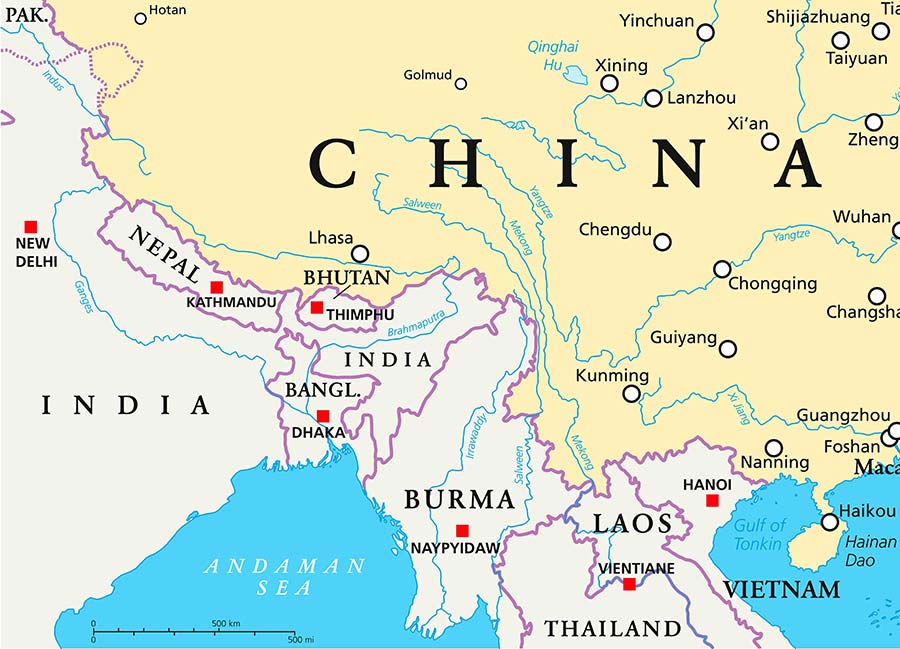Lhasa To Become South Asian Big Data Tech Link With China
Tibet A Belt & Road Gateway Between China, Nepal, Bangladesh, Bhutan, India & Myanmar
Op/Ed by Chris Devonshire-Ellis
The Tibetan SAR capital city, Lhasa is the site of a huge, 645,000 square metre data facility that is being built to power data exchange between China and its neighboring countries in South Asia.
The cloud computing and data center is being developed by private tech firm Ningsuan Technologies, and has begun its initial phase one testing operations as it announced the completion of the first construction phase.
The Tibetan plateau is now reconnecting as a bridge for China to South Asia under the Belt and Road Initiative. It had previously been a Silk Road route and trading center for goods passing through from China to Bangladesh and India, connected via ancient passes to Calcutta as its main service sea port. Goods from South-East Asia and beyond also made their way into China via the Lhasa trade route, including maddar, which is a plant extract coloring used for Buddhist monks robes. Other Indian and globally traded herbs and spices also made their way into Chinese cuisine through Lhasa, and into China including the chilli pepper, which is one reason why Sichuan, neighboring Tibet, has such fiery dishes. They originally made their way to India via the 16th century Portuguese and then on into China – via the Lhasa trade route.
Ningsuan is a Tibetan registered company with data control centers in Beijing and research teams in Nanjing, and is placing itself as a service center for anticipated trade and investment activity between China and India, Nepal, Bangladesh and other countries that are part of the Belt & Road Initiative. We discussed China’s rail and road connections with Tibet in the article Xi’an-Kathmandu Combined Road-Rail Service Launched a few days ago and explained the reasoning behind closer China-India ties in the article China’s Latest Outbound Investment Target: India.
These and related initiatives have increased the need for robust IT infrastructure in Tibet to support regional data transmission. South Asia’s hot and humid climate, combined with erratic power supply in equate to higher costs for running and maintaining data centers, Tibet is a natural data haven thanks to its temperate climate and low average temperatures, which are ideal for keeping servers cool.

Construction of the Lhasa data center began in 2017 and is scheduled for completion in 2025 / 2026. The total investment will amount to about US$1.69 billion, with the cloud facility estimated to generate a similar amount in annual revenue. China’s Alibaba is also involved.
In 2018, the company signed a deal with Ningsuan to bring cloud services to industries in the Tibetan region that span electricity supply, finance, national security, government affairs, public security and cyberspace.
Beijing has been encouraging both domestic and international investors to set up operations in Western China, including Tibet, and will provide profits tax breaks and incentives to do so. We discussed these in a recent article China Extends 15% Profits Tax Breaks To Qualifying Investors In Tibet .
The tax breaks apply to companies investing in Tibet in numerous investment sectors, including the testing, construction and operation of solar photovoltaic power generation systems, as well as broadband network construction and operations. Investors involved in these industries that have relevance to the provision of Big Data and Tech may contact us for advisory services concerning Tibet.
Related Reading
- The Belt & Road’s Trans-Himalayan Economic Corridor
- China Extends 15% Profits Tax to Qualifying Investors in its Western Regions
- Qinghai – Agriculture, Eco-Tourism, Tibet…And India?
About Us
Silk Road Briefing is written by Dezan Shira & Associates. The firm has 28 offices throughout Asia, and assists foreign investors into the region. For strategic advisory and business intelligence issues please contact the firm at silkroad@dezshira.com or visit www.dezshira.com





